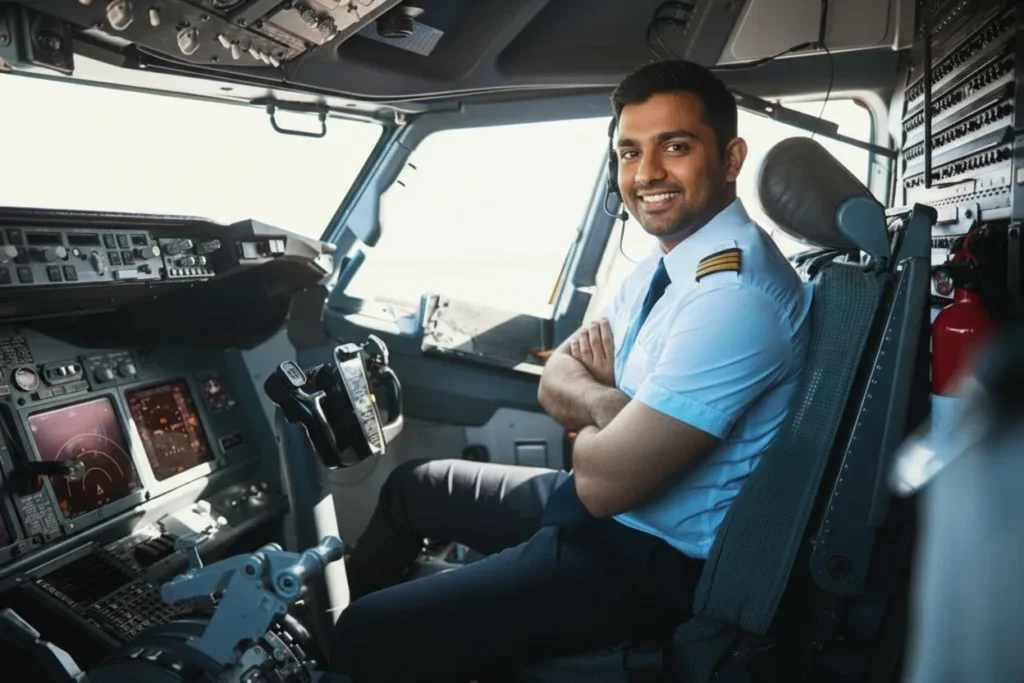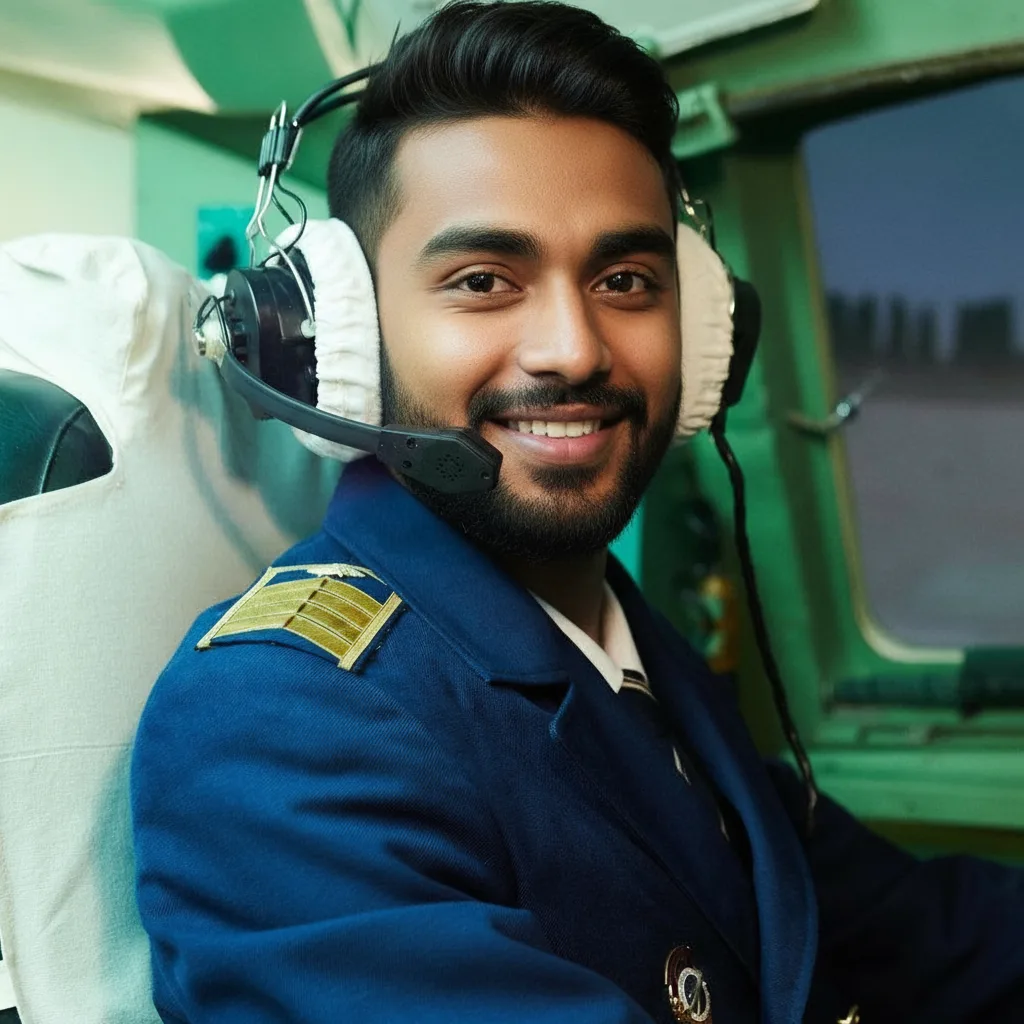Online Aviation Training Courses
Home Online Aviation Training Courses Online aviation training courses are transforming pilot education in India.Aspiring pilots now access DGCA ground...
DGCA Ground Classes in Ahmedabad, Surat, and Delhi (Ramphal Chowk) for aspiring pilots with 99% Success Rate in CPL Ground Exams.
Here aspiring pilots turn their dreams into flight-ready careers.
FMS Aviation Academy has training centres across India, equipped with modern classrooms, certified instructors, and advanced simulators. Each centre offers a focused, professional environment to support every stage of your pilot training journey.
Our first Academy in Gujarat - Premier pilot training hub with expert faculty and modern simulation labs.
Focused aviation learning centre offering personalized coaching and airline exam preparation.
At Ramphal Chowk, FMS brings the best of aviation training to hub of pilot training institutes in India.



FMS Aviation Academy guide you through step by step process to help you get Pilot Licenses. You start with your DGCA registration and we help you with DGCA Ground Classes & Trainings so that you clear your DGCA exams in the very first attempt.

Become a professional pilot with DGCA-approved training, flight hours, and all subject clearances.
Upgrade to captain-level credentials with India’s highest pilot certification for airline careers.

Learn to fly for personal use with foundational flight training and basic aviation knowledge.
Book Your DGCA Ground Training With Us

Experience real-world flight scenarios in our advanced simulators to build core flying skills and confidence.
Our flagship CPL program covering all DGCA subjects, flight hours, and practical training to become a licensed commercial pilot.
Hands-on cockpit sessions to familiarize you with aircraft controls, instrumentation, and in-flight decision-making.
Your most comprehensive guide to become a pilot - from medicals, to ground training to flight training and CPL application. We are here to make your flying dream comes true.


Learn from India's Best Aviation Academy - how to become a pilot in 2025.
Get ready for your aviation career.
When aspiring pilots search for the most credible and results-driven aviation institute in India, FMS Aviation Academy consistently emerges as a top choice. With its steadfast commitment to excellence, personalized mentorship, and high DGCA exam success rates, FMS has become one of India’s most trusted names for DGCA Ground Classes and Pilot Training. Headquartered across rapidly developing aviation hubs – Ahmedabad, Surat, Delhi, Dehradun – FMS Aviation Academy offers structured programs that prepare students for a rewarding career in the skies.
Before a student can earn their wings, they must first conquer the theory that underpins all aspects of aviation. In India, DGCA Ground Classes are a mandatory prerequisite for obtaining a Commercial Pilot License (CPL) or a Private Pilot License (PPL). These classes cover core subjects like Air Navigation, Meteorology, Air Regulations, Technical General and Technical Specific, Radio Telephony, and more.
The Directorate General of Civil Aviation (DGCA) – India’s top aviation regulatory body – administers these exams to ensure that every future pilot has the theoretical foundation needed to fly safely and responsibly. Simply put, without acing your DGCA ground papers, pilot training is incomplete. This is where FMS Aviation Academy excels – not just in training students for exams, but in building pilots who understand aviation deeply and thoroughly.
Founded by aviation experts and ex-airline professionals, FMS Aviation Academy was established with a clear mission: to bridge the gap between theoretical knowledge and real-world aviation challenges. The academy has crafted a rigorous and engaging curriculum that meets DGCA requirements while preparing students to excel in high-pressure airline environments.
From day one, the institute emphasizes core concepts, mock tests, situational analysis, and real-time application – ensuring that students not only pass DGCA ground classes but also develop strong decision-making skills essential for cockpit leadership.
FMS has helped hundreds of students realize their dream of becoming pilots, with many graduates now flying with major domestic and international airlines. Their strong alumni network is a testament to the quality of pilot training provided at the academy.
Ahmedabad, a city blending heritage with modern aviation growth, is home to one of FMS’s flagship centers. The Ahmedabad campus is equipped with high-tech classrooms, experienced instructors, and aviation-focused study zones. The DGCA Ground Classes here are especially popular among students from Gujarat, Rajasthan, and Madhya Pradesh, thanks to its central location and student-friendly infrastructure.
Surat, known for its booming infrastructure and industrial prowess, is fast becoming a destination for aviation aspirants. FMS Aviation Academy in Surat provides complete DGCA syllabus coverage, daily revision sessions, and weekend mock tests to ensure consistent student performance. The center’s faculty includes CPL holders and airline professionals who bring practical exposure into the classroom. Surat’s aviation ecosystem, combined with FMS’s methodical pilot training approach, makes it an ideal location for students who want to stay close to home without compromising on quality.
FMS Aviation Academy, located at Ramphal Chowk, Delhi, is a leading hub for DGCA Ground Classes where India’s aspiring pilots are trained. The academy offers 1-on-1 mentorship from airline captains and a smart AI-based learning platform, ensuring students get the best preparation for DGCA exams and CPL journey.
DGCA-Focused Curriculum: FMS offers one of the most detailed and exam-oriented syllabi for DGCA Ground Classes. Every subject is broken down into digestible modules with real-time Q&A, updated study materials, and personalized doubt-solving sessions.
Expert Faculty: FMS employs a dedicated team of instructors who are licensed pilots, ex-ATPL holders, and aviation subject matter experts. Their deep understanding of DGCA expectations ensures that students are always ahead of the curve.
Flexible Batch Timings: With weekday and weekend batch options, FMS makes pilot training accessible even for working professionals or college students planning to transition into aviation full-time.
Mock Tests & Progress Tracking: Regular mock tests and feedback sessions help track each student’s understanding. These tests mirror the DGCA examination pattern, providing familiarity and confidence before the actual exam.
One-on-One Mentorship: Whether it’s academic guidance or career counseling, FMS offers individual mentorship programs. Students are regularly coached on exam techniques, stress management, and future pathways like CPL, ATPL, or Type Rating.
High Success Rate: Over the years, FMS students have maintained a high success rate in DGCA exams, especially in subjects like Air Navigation and Meteorology, which are considered more complex.
Integrated CPL Roadmap: Unlike many standalone ground schools, FMS provides a complete pilot training roadmap—from ground school to flying school guidance, documentation support, and conversion processes for those looking at international flying licenses.
FMS doesn’t just train students to crack exams – it builds future-ready pilots. In addition to DGCA Ground Classes, the academy provides workshops on airline interviews, simulator training introductions, communication skills, and personality development—skills essential to succeed in competitive airline assessments.
Guest sessions by senior pilots, DGCA officials, and flight instructors are regularly held to provide industry insights and to keep students aligned with the latest aviation regulations and technologies.
FMS also assists students in selecting DGCA-compliant flying schools both in India and abroad. Whether it’s Canada, South Africa, New Zealand, or the U.S., the team helps with pilot log validation, license conversion processes, and guidance on flight hours required by DGCA. Their tie-ups ensure that students transition smoothly from ground training to actual flight training – making it one of the most comprehensive pilot training academies in India.
Students consistently rave about the personalized attention, clarity of concepts, and the supportive environment at FMS. Alumni often return to mentor current batches, and many attribute their DGCA exam success and airline placements to the academy’s structure and guidance.
Whether you’re preparing for your first DGCA exam or planning to reattempt a subject, FMS provides the community, resources, and teaching expertise to help you succeed.
Here’s a final update about FMS Aviation Group:
Best-in-class DGCA Ground Classes with a proven track record
Presence in Ahmedabad, Surat, Delhi, and Dehradun covering major aviation regions.
Dedicated support for both fresh aspirants and reattempting candidates
Focused pilot training roadmap from theory to flight school recommendations
High success rate and alumni flying with top domestic & international airlines
Whether you dream of becoming a commercial airline pilot or are taking the first steps in aviation, FMS Aviation Academy is the launchpad you’ve been looking for. With its deep-rooted commitment to excellence in DGCA Ground Classes and end-to-end pilot training, it continues to shape the next generation of Indian aviators.
Learn everything about becoming a pilot in India. You will find all relevant information here and if you couldn't find something you wish to know, simply reach out to us.
Home Online Aviation Training Courses Online aviation training courses are transforming pilot education in India.Aspiring pilots now access DGCA ground...
Home DGCA ATPL Exam Preparation: Syllabus, Tips & Best Online Course DGCA ATPL exam preparation is the final academic step...
Home A320 Type Rating Course India: Fees, Duration & DGCA Approval Guide The A320 Type Rating Course India is essential...
Home Hidden Costs of Pilot Training: What Your Academy Might Not Tell You Pilot training cost is often advertised attractively...
Step 1: Medical Fitness
Obtain a Class II Medical Fitness Certificate from a DGCA-approved Medical Examiner before Ground Training.
Upgrade to a Class I Medical Fitness Certificate from the DGCA prior to CPL Flight Training.
Step 2: Educational Qualifications
Complete 10+2 with Physics and Maths from an approved board or NIOS.
Step 3: Apply for Computer Number
This number plays a crucial role in DGCA examinations and serves as your identity for correspondence with the DGCA.
Step 4: Ground Training and Theory Exams
Enroll with FMS Aviation Academy to help prepare for the DGCA theoretical examination subjects and RTR-A with concept-clearance and deep knowledge and understanding.
Clear the DGCA examinations with 70% or more.
Clear Part I and Part II of the RTR-A examination.
Step 5: Flight Training
Enroll with a DGCA-approved Flight Training Organization to complete the necessary simulator and aircraft training to fulfill the 200-hour requirement for a CPL.
Step 6: Apply for the CPL
Submit the required documentation to the DGCA to be issued a Commercial Pilot License (CPL)
Step 7: Special Ratings
Specialize by obtaining Multi-Engine Rating, Instrument Rating, and specific aircraft Type Rating (Boeing 737/Airbus A320, etc.).
Step 8: Airline Entrance Exam Preparation
Prepare for the airline entrance exam and job interview process by enrolling with FMS Aviation Academy and undergoing a rigorous training in the state-of-the-art flight simulator and Pilot Aptitude Test software, along with GD and interview preparations.
Step 9: Enjoy a fulfilling career as an Airline Pilot
This is an opportune time to become a pilot in India.
With India's rapid economic growth and a burgeoning aviation market, there is significant potential.
The percentage of the population that travels by air is set to soar in the coming years.
Despite challenges like infrastructure, the government, led by Prime Minister Narendra Modi, is proactive. In 2023 alone, 1100 licenses were issued, indicating a growing need for skilled pilots.
The Ministry of Civil Aviation is actively promoting the industry, making it an excellent time to embark on a pilot career with promising job opportunities and a global aviation hub vision.
Absolutely! Age is not a barrier in pursuing a pilot career. Several airlines are now accepting applications up to 40 years for First Officers. Considering the current timelines for completing exams, flight training, and obtaining a CPL, you can realistically start applying for jobs within two years. With dedication, it's possible to expedite this process in around a year and a half. The aviation industry's future is incredibly promising, so there's ample time for you to pursue your dream without hesitation. Go ahead and embark on this exciting journey!
To become a pilot in India, a 12th pass with maths and physics is the primary requirement. The marks you scored in 12th grade are not a determining factor. Regulators only require your passing certificates for issuing a license, without considering the marks obtained. While having additional qualifications is beneficial for your resume, it's not a necessity for pilot training. Some airlines may have credit programs with specific criteria for marks in maths and physics, so it's advisable to check their website if you plan to pursue training through such programs.
Although obtaining scholarships for pilot training in India is challenging, there are limited opportunities from certain state governments and NGOs. If you are seeking financial assistance, it's recommended to reach out directly to these organizations for potential support.
Obtaining DGCA Class II and Class I medicals involves referring to the listed DGCA impact panel examiners on the website. The specific tests and criteria are outlined, with Class II being the initial step. If fit, individuals proceed to the medical officer at DGCA for Class I. While many clear these medicals without issues, some might face challenges in their reports. It's reassuring that a second opinion and review by the medical officer are available to rectify any concerns. Overall, the process is generally manageable for those with good health.
While most Indian banks may not typically consider commercial pilot training as education, there are exceptions. Some banks may approve it under special circumstances. It's advisable to verify this information, and if interested, individuals can explore the possibility of obtaining a loan for pilot training through certain central banks under their education loan schemes.
In recent years, the Indian aviation market has experienced significant growth, leading to more demanding flying conditions, especially with the increase in night flights. This shift has impacted pilots due to disruptions to their circadian rhythm. Recognizing the challenges, the regulator has introduced Revised Civil Aviation Regulations effective from June 1, addressing issues like increased rest hours and redefining night time, offering relief to the pilot community. While the payout in India is comparatively lower than some international counterparts, considering the country's inflation and standards, it remains a lucrative career. Despite challenges, being an airline pilot in India is still considered glamorous, offering opportunities to travel, stay in top-notch hotels, and holding a respectable position.